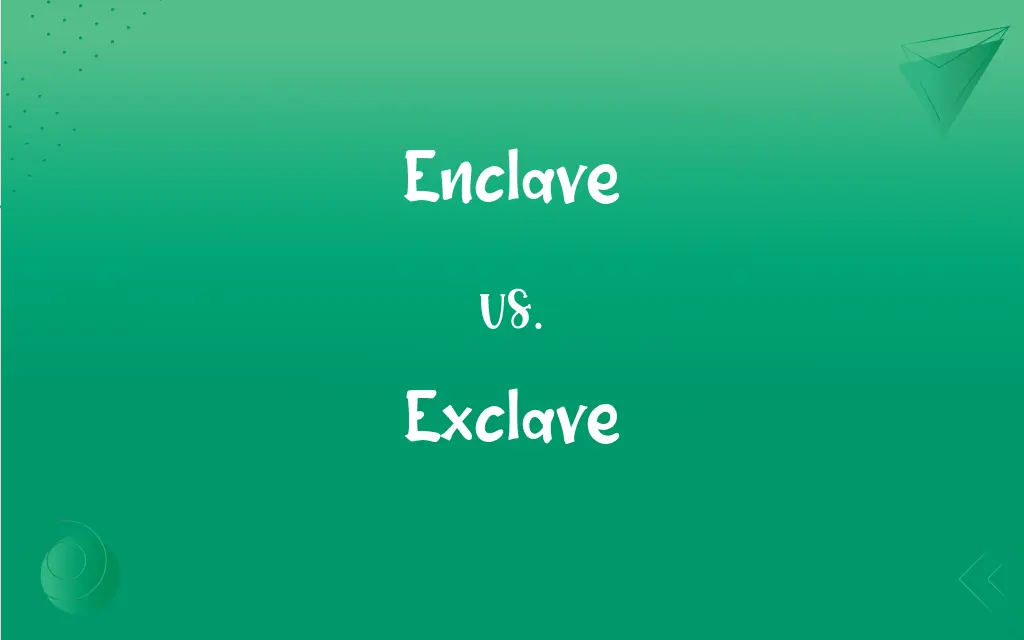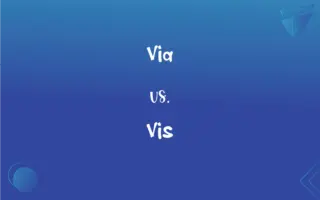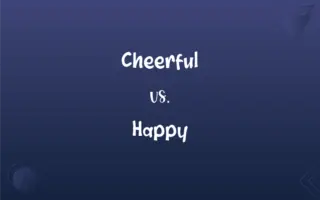Enclave vs. Exclave: What's the Difference?
Edited by Janet White || By Harlon Moss || Updated on November 13, 2023
An enclave is a territory entirely surrounded by another territory, while an exclave is a portion of a territory separated from the main part and surrounded by other territories.

Key Differences
An enclave is a distinct area or group enclosed within a larger one, such as a country completely surrounded by another country. On the other hand, an exclave is part of a country's territory separated from the main area and often surrounded by foreign land. The enclave is defined by its inclusion within an external boundary, whereas the exclave is characterized by its separation and isolation from its parent territory.
The concept of an enclave implies a sense of cultural or social distinctness, as it is a pocket of territory that is different from the surrounding area. An exclave, while also distinct, emphasizes political or administrative separation rather than cultural. Enclaves may have a unique identity due to their isolation, while exclaves might share more in common with their surrounding areas due to their geographical spread.
An enclave can exist within a single country or be an international territory, such as Vatican City, which is an enclave within Rome, Italy. In contrast, an exclave can refer to a region like Kaliningrad, which is part of Russia but lies between Poland and Lithuania, separate from the rest of Russia. An enclave is always surrounded by another single territory, while an exclave may be bordered by multiple different territories.
The residents of enclaves might face travel restrictions as they are enclosed by another territory, whereas exclave inhabitants may enjoy more freedom of movement if there are friendly relations with the surrounding nations. The enclave can sometimes be a safe haven or a cultural preserve, while an exclave can be strategically important or sometimes contentious due to its separation from the main territory.
While enclaves and exclaves are both types of territories that can cause geographical oddities, their distinguishing features lie in their relationship to the surrounding land and political boundaries. Enclaves are completely enclosed by another territory, fostering a sense of inward identity, while exclaves are more outwardly oriented due to their separation from the home country.
ADVERTISEMENT
Comparison Chart
Territorial Layout
Completely surrounded by another territory
Separated from the main territory and surrounded by other territories
Type of Separation
Cultural or social distinctness within a larger area
Political or administrative separation from the parent country
Examples
Vatican City within Italy
Kaliningrad of Russia between Poland and Lithuania
Travel Restrictions
Possible due to being surrounded
May vary, often less restrictive if surrounded by friendly countries
Relation to Surrounding Land
Defined by inclusion within an external boundary
Characterized by isolation from the parent country
ADVERTISEMENT
Enclave and Exclave Definitions
Enclave
A minority group or culture surrounded by a larger group.
The Amish community is an enclave in the United States.
Exclave
A part of a territory geographically separated from the main part.
Kaliningrad is a Russian exclave.
Enclave
A distinct area with different laws or norms.
The diplomatic enclave has its own security protocols.
Exclave
An area separated by physical barriers.
The mountainous region acted as an exclave from the rest of the country.
Enclave
A secluded or isolated area within a larger region.
The gated enclave was quiet and private.
Exclave
A politically detached piece of land.
The exclave was difficult to govern due to its distance from the capital.
Enclave
An area distinct in its biodiversity or ecology.
The national park acts as an enclave for endangered species.
Exclave
A culturally distinct area separated from its parent territory.
The linguistic exclave preserved its dialect independently.
Enclave
A territory entirely surrounded by another territory.
Lesotho is an enclave within South Africa.
Exclave
A fragment of land belonging to one state but situated in another.
The exclave’s border control was strict to maintain sovereignty.
Enclave
A country or part of a country lying wholly within the boundaries of another.
Exclave
A part of a country that is isolated from the main part and is surrounded by foreign territory.
Enclave
A distinctly bounded area enclosed within a larger unit
Ethnic enclaves in a large city.
Exclave
A portion of a country's territory not connected to the main part
Alaska and Kaliningrad are both examples of exclaves.
Enclave
A political, cultural or social entity or part thereof that is completely surrounded by another.
The republic of San Marino is an enclave of Italy.
The streets around Union Square form a Protestant enclave within an otherwise Catholic neighbourhood.
Exclave
A detached part of an organ, as of the pancreas, thyroid (accessory thyroids), or other gland.
Enclave
A group that is set off from a larger population by its characteristic or behavior.
...it tends to make marriage itself a lifestyle enclave.
Exclave
A portion of a country which is separated from the main part and surrounded by politically alien territory.
Enclave
(computing) An isolated portion of an application's address space, such that data in an enclave can only be accessed by code in the same enclave.
Enclave
(transitive) To enclose within a foreign territory.
Enclave
A tract of land or a territory inclosed within another territory of which it is independent. See Exclave.
Enclave
To inclose within an alien territory.
Enclave
An enclosed territory that is culturally distinct from the foreign territory that surrounds it
FAQs
What’s an example of an enclave?
Vatican City is an enclave within the city of Rome, Italy.
What is an enclave?
An enclave is a territory completely surrounded by another territory.
Can an exclave also be an enclave?
Not usually, because an exclave is not surrounded by one country alone.
Can an enclave also be an exclave?
Yes, if it's politically distinct from the surrounding territory and part of another country.
What’s an example of an exclave?
Kaliningrad is a Russian exclave between Poland and Lithuania.
Are enclaves and exclaves common?
They are not common but can be found in various parts of the world.
Do enclaves and exclaves have different laws?
They may have laws that differ from the surrounding territory due to their unique status.
Are enclaves independent countries?
Some enclaves like Vatican City are independent, but not all.
What is an exclave?
An exclave is a part of a territory that is politically separated from the main part.
How are enclaves and exclaves created?
They are often results of historical treaties, wars, or geographic anomalies.
Why do exclaves exist?
Exclaves can exist for historical, political, or strategic reasons.
Do enclaves have their own government?
Some do, especially if they are sovereign states; others may be governed by the surrounding country.
Can exclaves be economically self-sufficient?
It varies, but many exclaves rely on the main country or surrounding territories for trade and resources.
Can an enclave exist within the same country?
Yes, enclaves can be within the same country, separated culturally or administratively.
How does an area become an exclave?
Areas can become exclaves due to changes in political borders that leave part of a country separated from the rest.
Are enclaves always small?
Not necessarily, though most enclaves tend to be smaller regions.
Can exclaves be accessed without crossing international borders?
Generally, no, unless there are specific agreements in place that allow for this.
Do exclaves have military importance?
Yes, some exclaves have strategic military significance due to their location.
Are residents of enclaves citizens of the surrounding country?
Not usually; enclave residents are typically citizens of the country to which the enclave belongs.
Is travel to and from exclaves restricted?
It depends on the international agreements and relations with surrounding countries.
About Author
Written by
Harlon MossHarlon is a seasoned quality moderator and accomplished content writer for Difference Wiki. An alumnus of the prestigious University of California, he earned his degree in Computer Science. Leveraging his academic background, Harlon brings a meticulous and informed perspective to his work, ensuring content accuracy and excellence.
Edited by
Janet WhiteJanet White has been an esteemed writer and blogger for Difference Wiki. Holding a Master's degree in Science and Medical Journalism from the prestigious Boston University, she has consistently demonstrated her expertise and passion for her field. When she's not immersed in her work, Janet relishes her time exercising, delving into a good book, and cherishing moments with friends and family.































































